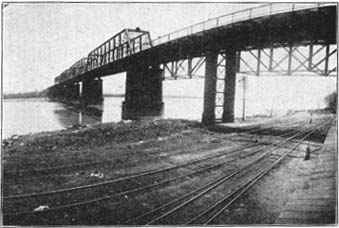at a time of great commercial depression and
thrown open vast tracts to the grasp of speculators."
At the election which
followed October 11th the principal contest was over
delegate to congress. There was great contrast between
the candidates. Estabrook was a scholarly polished
lawyer. Daily, to whom more than to anyone else belongs
the distinction of being the founder of the republican
party in Nebraska, was a typical agitator,--restless,
untiring, strategic. He was unlettered and the opposition
were never weary of ridiculing his grammar. They
nicknamed him "Skisms" Daily, because of his
pronunciation of "schism," but he had the knack of
getting next to the people which served him well in the
stormy campaigns of the early days. The official returns
elected the entire democratic ticket, including a
majority of the legislature. The vote for Estabrook was
3,100, for Daily 2,800 and the returning board gave
Estabrook the certificate of election. Daily contested
the seat on the ground that the vote of several counties
was fraudulent, and cited in particular Buffalo county
where 292 votes were returned for his oponent (sic) and
none for him, most of this vote coming from Fort Kearney.
The house had a republican majority and gave Daily the
seat.
Some events outside of
political controversies claim our attention before
passing into the new decade. The first territorial fair
was held on September 21 at Nebraska City. The orator for
the occasion was J. Sterling Morton and his address at
that time will remain a classic in Nebraska history,
descriptive of society in the early territorial days. The
fair was a wonderful exhibit of Nebraska's fertility.
The pioneer religious
denominations in Nebraska, as already noted, were the
Baptist and Presbyterian,--represented by missionaries to
the Indians. Father P. J. DeSmet, the famous Catholic
missionary, was contemporary with them, taking charge of
the mission to the Pottawotamie Indians at Council
Bluffs, Iowa, in 1838 and from that time on frequently
engaged in mission work in Nebraska. The Methodist church
came next, the first regular church work beginning at
Nebraska City in October, 1851, in charge of Rev. W. D.
Gage, Congregationalism in Nebraska dates from Christmas
Day, 1855, when Rev. Reuben Gaylord and wife crossed the
Missouri at Omaha and organized the First Congregational
church there during the year which followed.
On December 6, 1859,
the first Nebraska press association was organized at the
Herndon Hotel, Omaha, with six newspapers represented.
The Nebraska Board of Agriculture dates from October 14,
1858, when a bill for its incorporation, introduced by
Robert W. Furnas, became law. The first woman suffrage
movement began earlier. On the 8th of January, 1856, Mrs.
Amelia Bloomer, then living at Council Bluffs, Iowa, and
author of the "bloomer" costume, appeared by invitation
before the Nebraska legislature and made an address in
favor of suffrage for her sex.
The year 1859 was the
year of "Old John Brown's" raid on Harper's Ferry ending
in his trial and execution. Brown was a familiar figure
in southeast Nebraska for several years, crossing from
Iowa into Kansas by way of the Nemaha valley. An
"underground railroad" route for the escape of slaves ran
across the same tract to Tabor, Iowa.




